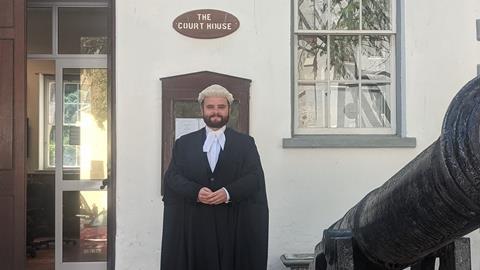I firmly believe that our criminal justice system is on the cusp of collapse. That is not hyperbole, nor a snappy soundbite, but a well-founded observation from someone who has spent the past decade at the coalface of criminal justice.
I have recently returned to criminal defence following two years on St Helena Island, a tiny British overseas territory in the middle of the South Atlantic. I had the pleasure of taking up the role of Crown Counsel, the island’s (only) prosecutorial role. Despite having a population of only 4,000, there is a surprisingly busy criminal justice system.
As a remnant of the British Empire, the legal system of St Helena, Ascension and Tristan da Cunha closely follows that of England and Wales. Whilst following most laws passed in the UK parliament (oddly enough only legislation enacted before 1 January 2006), the territory is ultimately self-governing and can pass its own laws. This throws up some interesting quirks – the legal drink drive limit is the highest anywhere in the world, defendants can opt to dispense with a jury and be tried by judge alone and some of the local laws have not been updated in decades (the maximum penalty for smuggling drugs into prison is a fine of just £5).
Perhaps most disconcerting is the 100-year-old law applying only to the island of Tristan da Cunha, which prescribes a maximum penalty of £2 for discharging a firearm to the danger of another person (ie possession of a firearm with intent to endanger life).
Despite the idiosyncrasies and curiosities of St Helena’s criminal justice system – it just works. Actually, it works incredibly well. The two years I spent out there were some of the most professionally satisfying and eye-opening of my career. The contrasts are stark, and our own justice system could learn a great deal, despite the vast differences in scale.
Despite relying almost entirely on UK government aid, the St Helena government still manages to provide a well-funded and well-resourced legal system. Islanders benefit from a properly funded public defender service staffed by UK qualified lawyers and supported by a number of St Helenian ‘Lay Advocates’ (akin to McKenzie friends). There is a well-funded prosecution service, a well-equipped prison service, and the positions of Chief Magistrate and Chief Justice (the equivalent of a District Judge and Circuit Judge) are both filled by British barristers on fixed-term contracts.
The professional and working relationship between the organs of St Helena’s legal system is constructive, effective and built on communication. Early engagement between the crown and defence takes place weeks before the first court hearing (and pre-charge engagement before that). Papers are often served a month in advance. Disclosure issues are non-existent. The defence solicitors (who are properly and fairly remunerated) can pick up a phone and speak directly to the prosecuting lawyer (and not have to wait 7-10 business days for an urgent email to be ignored). Case management is undertaken flawlessly by the courts, and adjournments and wasted hearings are rare. Legal aid eligibility is simple, fair, and granted without the need for a technically irksome portal (or irksome decision makers). Charging decisions (and decisions to deal with cases out-of-court) are made sensibly, swiftly, and without the need for onerous and meaningless red tape, targets or cumbersome bureaucracy.
The police refuse to allow cases which are ‘released under investigation’ to fall into the ether for months (and often years), but are in fact proactive, and unafraid to make decisions. Defendants and victims involved in rape cases do not have to wait years for justice. The probation service (a staff of two), effectively and proactively manage offenders with frequent assistance which focusses on rehabilitation and support. Court directions and the Criminal Procedure Rules are complied with. Pre-sentence reports are meaningful and tailored to address the individual needs of defendants. People are accountable, yet not afraid to make decisions and assume responsibility. The court building (the most remote in the world), whilst built circa 1600 is not mouldy, held together by duct tape, stuffed with asbestos or leaking sewage.
His Majesty’s government provides the St Helena government with £30 million of funding each year which finances the majority of the territory’s public services. Only a very small fraction of this is spent on the justice system. In contrast, HMG also recently paid £300 million for the rollout of the Common Platform case management system in England and Wales – a system so ineffective, useless and administrability burdensome that 97% of court legal advisors voted to stage mass walkouts over its inception. To put this into context, this sum could have funded the entirety of the St Helena aid budget for a decade.
The problems we have cannot be solved by repeated cries of 'more money!', but can only be fixed by wider, fundamental changes to the way our system works. An increase in funding – while undoubtedly vital – is only part of the solution. That money needs to be apportioned properly (yes – defence practitioners have not received a pay increase in real terms since the 90s).
HM government regularly asserts that the British legal system is the best in the world, but the reality is undeniably different. Britain could learn a lot from the workings of its overseas territories, where well-funded, adhocratic and effective legal systems are putting our own to shame.
Ben Brown is Law Society council member for criminal defence, and former Crown Counsel to St Helena, Ascension and Tristan da Cunha
































7 Readers' comments